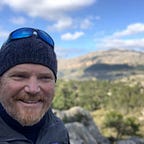Evolving into a mature species
A conversation between Elisabet Sahtouris and Daniel Wahl
On July 28, 2020 I caught up with Elisabet Sahtouris, who I used to go and visit in Deya, Mallorca, when we both still lived on the same island. Now she lives on Hawaii. We overlap in a number of circles. We are both members of the Findhorn Foundation Fellows circle and the Evolutionary Leaders (in Service to Conscious Evolution). We also share a background in biology and evolutionary theory, as well as bio-inspired design and consciousness studies.
At over 80 now, I invite Elisabet to look back at her path. From a childhood in the Hudson Valley spending lots of time in the forest and on the riverbanks during the latter part of the Great Depression, when she was very inspired by her biology teacher but sent to art school by her parents. Eventually she did a degree and a doctorate in biology and work at the National History Museum in New York, before she started to look beyond the scientific way of seeing and knowing to many other sources and traditions of insight in an attempt to “expanding her worldview”.
Later she went back into evolutionary science and started collaborating with Jim Lovelock and Lynn Margulis attending a series of symposia on Gaia Theory and Earth Systems Science that Teddy Goldsmith funded in the 1990s in Cornwall.
Elisabet explains how she increasingly became aware of the limitations of the theory of thermodynamics and conventional Darwinian science that is still too focussed on competition (alone) as the driver and stated to explore the cooperative and syntropic (neg-entropic) patterns of life’s evolution.
Elisabet thinks of evolution in phases she sees as part of the ‘maturation cycle’ (immature or juvenile stage of a species evolution and the mature phase of a species functional membership in the wider community of life).
We speak about:
— the microbiome,
— epigenetics,
— the work of David Sloan Wilson on multilevel selection,
— the work of John Stewart on complexity and evolution,
— the ‘maturation cycle’ and what it means for human evolution,
— naturally evolved cities as cells growing and evolutionary entities,
— bioregions as natural watersheds,
— briefly about Sir Patrick Geddes,
— the ancient farming system on Hawaii (the ahopuah system) ,
— the importance of Polynesian ancestral wisdom to the future of our species,
— Jack Weatherfield’s book ‘Indian Givers’ and great law of peace and representative democracy that existed in North America before colonialisation,
— the Way of Council (collective intelligence and distributed decision making),
— Elisabet’s work in organising a series of gatherings of Eastern and Western scientists and later also Islamic Scientist to explore the axioms of their different methodologies and worldview,
— Elisabet explains her metaphor of the ‘keyboard’ spectrum from matter, to elector-magnetic radiation, to zero point energy. “That is where Western science gets stuck as it started with dead matter, but in the ‘higher keys’ as they are less material with mind, and spirit and consciousness. … the Eastern Science/Philosophers started on the other end of the keyboard with a conscious living universe.
— imminent (embodied) and transcendent spirituality
— the quantum physicists of the early 20th Century looking towards Vedic sciences as they could otherwise not explain their results
— making the worldview of science more explicit — Elisabet’s work on an economy that learns from living systems and Islamic Science as the “science of a living universe”
— the need for a true health care system and not just a sickness care system — the rocky and transformational road ahead
— future of humanity as a bioregional future!
— subsidiarity and true citizens participation (as well as education, decolonialization of the mind and eco-literacy building)
I invite Elisabet to end with a Hafiz quote I first heard from her: “Never once in all this time, has the sun said to the Earth: Earth you owe me! Look what happens with a love like that! It lights up the whole sky!”
Here is the recording of our conversation:
—
If you like the post, please clap AND remember that you can clap up to 50 times if you like it a lot ;-)!
Daniel Christian Wahl — Catalyzing transformative innovation in the face of converging crises, advising on regenerative whole systems design, regenerative leadership, and education for regenerative development and bioregional regeneration.
Author of the internationally acclaimed book Designing Regenerative Cultures
Please consider supporting my ongoing work by becoming a patron:
